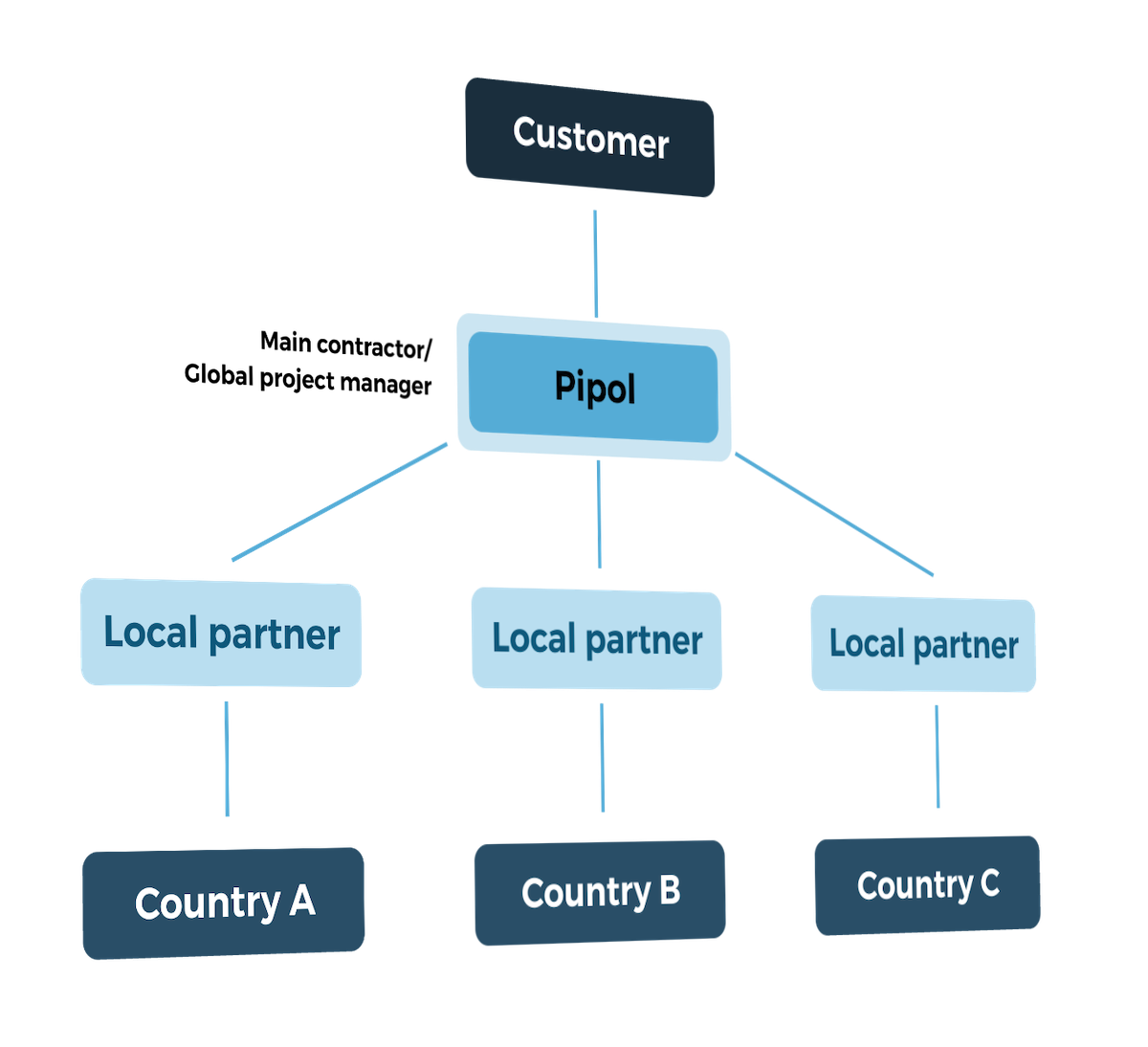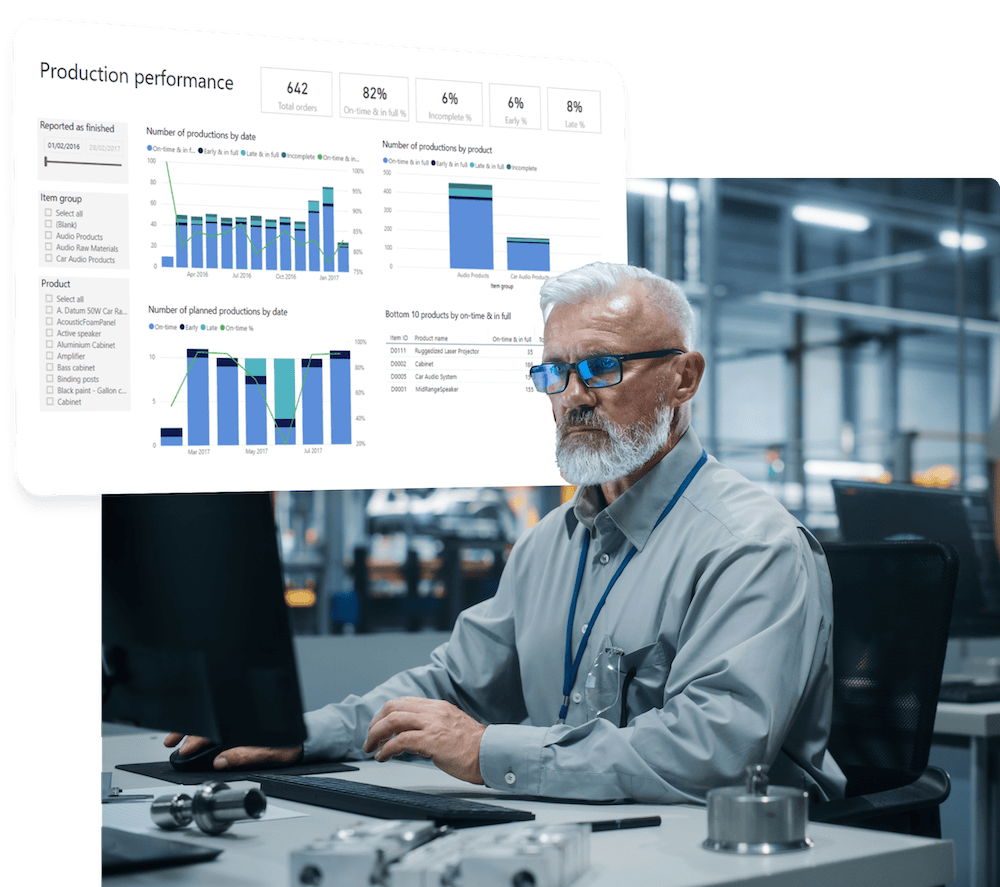Global Dynamics 365 ERP projects made simple
Complexity is often the biggest hurdle when companies need to engage in international ERP projects. At Pipol, we have one clear mission: to mitigate this complexity. We do that by levering our global reach and implementing with locally skilled consultancies around the globe.

Streamlined international project management
We support international companies with their international Dynamics ERP implementations, and help eliminate the chaos of working with numerous and very different local partners. We offer a comprehensive, centralized solution that helps us simplify your international ERP project. We call it the Pipol Model:
One contact
As a customer, you will have one point of contact to ensure a smooth, well-coordinated project from strategy and solution choice to implementation and support and to reduce your overall risk.
One delivery
As a customer, you will tap into our proven delivery and methodology framework designed to secure consistent and centrally managed international implementations and reduce complexity, cost, and risk.
One contract
Working with Pipol means that you will have one contract governing your worldwide delivery – and our services can be provided in local language, local time zone, and at local rates.
One team
Your organization will engage with one global team present in 85+ countries and with experience from more than 500 international Dynamics 365 ERP implementations.
One solution
At Pipol we offer you one global solution enabling you to streamline processes and harmonize data and analytical capabilities across your entire international business.
You might also want to read:
We don't "just" do ERP implementions
To ensure your project's success, we offer a full suite of business transformation services, including:
- Strategic planning
- Capability assessments
- Advisory about ISV add-on solutions
- Project evaluations
- License Management
- International Support
With Pipol, handling multi-country ERP projects becomes seamless. We orchestrate and unify business processes and applications across all your subsidiaries. This helps you optimize operations and boost your business performance and competitiveness.

How we do it
We focus on every aspect of your international Dynamics 365 ERP implementation, from defining clear project goals to identifying capability gaps and developing a tailored roadmap.
We plan from A to Z with a simple yet effective delivery model. It helps make your international implementation journey more manageable, as you will not have to deal with partners from many different countries; we have that part covered for you.
By leaving the coordination, preparation, risk handling, and invoicing to us, you can spend your time and energy preparing your organization for the changes, completing the data preparation, and setting the requirements.

How can your international organization benefit?
For companies looking to compete in the global marketplace, implementing a powerful ERP system like Microsoft Dynamics 365 on an international scale can transform their business operations and drive growth. An integrated, global approach to managing operations becomes essential as businesses expand across borders:
Standardization and centralization of business processes
International ERP implementation ensures consistency by standardizing and centralizing business processes across all locations. This unification reduces redundancies, minimizes errors, and simplifies compliance with global and local regulations.
With Dynamics 365, your business can maintain consistent workflows and practices, making identifying inefficiencies easier and optimizing operational performance worldwide.
Enhanced visibility and data accessibility
Dynamics 365 provides a unified platform that delivers real-time access to data across your entire organization, no matter where your teams are located. Whether financials, inventory, sales, or customer data, decision-makers gain complete visibility into operations at every level.
With accurate, up-to-date information, leaders can respond quickly to challenges, seize new opportunities, and drive more informed, data-driven decisions.
Improved global collaboration and communication
Implementing Dynamics 365 internationally enhances collaboration by breaking down geographical barriers. Teams across different countries can easily share insights, work on projects, and communicate seamlessly.
By promoting centralized communication, your organization fosters a more connected and collaborative global workforce, accelerating innovation and improving productivity.
Scalability and flexibility for global growth
An international Dynamics 365 system is designed to grow your business. Whether expanding into new regions or launching new subsidiaries, Dynamics 365 scales to accommodate the increasing complexity of global operations.
This flexibility ensures that your ERP solution continues to support consistent processes and efficient data management across all units as your company evolves. Dynamics 365 also adapts quickly to changing business needs, market conditions, and regulatory requirements, making it a powerful platform for sustaining long-term international growth.
Strategic planning
- Clear, measurable objectives: We collaborate to define ERP goals that support your broader business strategy and ensure measurable success.
- Detailed scope and roadmaps: We create comprehensive implementation roadmaps, offering clarity on scope, timelines, and cost estimates so you know exactly what to expect.
- Stakeholder alignment: We engage key stakeholders to ensure everyone is aligned, minimizing delays and misunderstandings.
Implementation of best practices
- Localization and compliance: We ensure that your ERP solution complies with local regulations, tax laws, and data protection standards—while keeping the integrity of your global system intact.
- Data Migration done right: Data accuracy is critical, especially across borders. We carefully manage data migration, cleansing, validation, and transformation to guarantee accurate results.
Change Management
- Comprehensive user training: We provide in-depth training for users across all regions, helping them understand the system and maximize its potential.
- Change Management tailored for global teams: Cultural differences matter. We craft change management strategies to help employees embrace new processes and tools, smoothing the transition.
Operational support
- Continuous support across regions: We offer ongoing support to address any issues that arise and ensure your systems run smoothly across all locations.
- Seamless integration: We optimize local rollouts by integrating Dynamics 365 with other business-critical applications for seamless, efficient operation.
Get in touch
Send us an email
Let us know what your challenges are all about. We are here to help.



